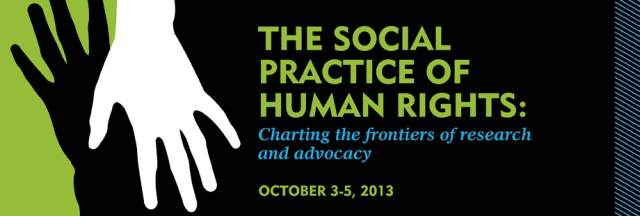Paper/Proposal Title
Transnational Advocacy Networks and the Use of Trauma Narratives
Location
River Campus - Room M2005
Start Date
10-4-2013 3:15 PM
Abstract
Along with the rise of transnational advocacy networks, the past few decades have seen an increased interest in personal narratives of trauma. Western audiences in particular have grown accustom to perceiving the public sharing of personal traumas as cathartic. The construction of a coherent narrative of one’s traumatic experience is seen as necessary for healing to begin. Personal accounts of trauma as told by local activists who have experienced human rights violations have often been utilized by transnational advocacy networks in human rights reports, articles and websites. The traumatized “other” engages in these public acts of revelation for the purpose of inspiring individuals to action. Local activists are thus able to narrate themselves into the international human rights sphere through discourses of trauma. Bringing together the linguistic, psychological, social movement and human rights scholarship concerning the public sharing of stories of trauma, this paper explores the link between private healing, public witnessing and political advocacy through narrative. As personal narratives are collected and disseminated within transnational advocacy networks, it becomes important to establish a reflexive praxis that allows for ethical engagement in the multitude of forums in which such storytelling takes place. This approach, arising from feminist methodologies, recognizes the inherent power differential between local and international actors and the need to ensure that the public revelation of trauma and the use of this revelation as advocacy be handled with respect for the sovereignty of each individual’s personal narrative.
Transnational Advocacy Networks and the Use of Trauma Narratives
River Campus - Room M2005
Along with the rise of transnational advocacy networks, the past few decades have seen an increased interest in personal narratives of trauma. Western audiences in particular have grown accustom to perceiving the public sharing of personal traumas as cathartic. The construction of a coherent narrative of one’s traumatic experience is seen as necessary for healing to begin. Personal accounts of trauma as told by local activists who have experienced human rights violations have often been utilized by transnational advocacy networks in human rights reports, articles and websites. The traumatized “other” engages in these public acts of revelation for the purpose of inspiring individuals to action. Local activists are thus able to narrate themselves into the international human rights sphere through discourses of trauma. Bringing together the linguistic, psychological, social movement and human rights scholarship concerning the public sharing of stories of trauma, this paper explores the link between private healing, public witnessing and political advocacy through narrative. As personal narratives are collected and disseminated within transnational advocacy networks, it becomes important to establish a reflexive praxis that allows for ethical engagement in the multitude of forums in which such storytelling takes place. This approach, arising from feminist methodologies, recognizes the inherent power differential between local and international actors and the need to ensure that the public revelation of trauma and the use of this revelation as advocacy be handled with respect for the sovereignty of each individual’s personal narrative.




Comments
This biennial conference provides a unique space for scholars, practitioners and advocates to engage in collaboration, dialogue and critical analysis of human rights advocacy — locally and globally. Learn more about the Human Rights Center at the University of Dayton >>>.